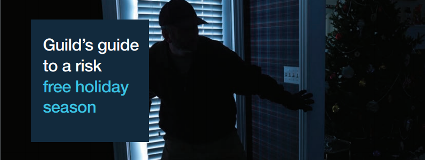Insurance for dentists
When it comes to insurance, we don't want you to simply go with the flow. Which is why at Guild, we're constantly evolving to reflect the real-life needs of dentists like you.
Join Guild Insurance today and choose to be protected by an insurer that's worked hand in hand with ADA NSW, ADA SA, ADAVB and ADATAS for over 25 years.

Professional indemnity and liability
Protects you for what you do as a dentist.

Business
insurance
Protects your dental practice and items in it.
Professional indemnity insurance covers you for your civil liability when a claim arises from a breach of your professional duty. For many professional policies at Guild Insurance combine professional indemnity, public liability, and product liability to cover more of your professional duties. Business insurance, on the other hand, is a broader category that encompasses various types of coverage designed to protect businesses from a wide range of risks. This can include property damage, theft, and liability claims from third parties.
For professionals providing advice or services:
- Assess your service risk: Evaluate the potential risks associated with your professional advice or services. Consider the possibility and implications of your advice or actions leading to a client's physical, psychological, or financial detriment. Reflect on the likelihood and consequences of a situation where an error or omission on your part could lead to legal action.
- Understand legal requirements: Familiarise yourself with the legal and regulatory landscape relevant to your profession. Is holding professional indemnity insurance a legal requirement or an industry standard in your field?
For certain contract positions and many allied health professionals regulated under Ahpra require professional indemnity and/or public liability insurance. - Consider your financial exposure: If faced with a legal claim, could you afford the legal defence and potential damages out of pocket?
For business owners protecting their operations:
- Identify your business assets: Determine which physical assets are crucial to your business operations, such as property, equipment, and inventory. Consider the consequences if these assets were damaged, stolen or lost.
- Evaluate liability risks: How likely is it that someone could be injured or their property damaged because of your business activities? This includes both public liability and product liability.
- Consider business interruptions: Think about the resilience of your business in the face of unforeseen events that might force temporary closure. How would such interruptions impact your financial stability?
If you are unsure of the cover you require, please contact us on 1800 810 213 to speak to an insurance specialist.

Key Product Features
Discover the limits and coverage built in to every Guild dentist liabilities policy.
Renewal FAQs
See the latest frequently asked questions and information for renewals in 2025.
Association Endorsed
Find out more about our long standing partnership with several branches of the ADA.
Hear from other dentists
01/09/2024
01/07/2024
01/01/2025

Working with over 130 associations

Insuring Australians for over 60 years

100% Australian owned
Learn how Dentists avoid claims with RiskHQ
Guild's guide to a risk free holiday season
With the holiday season approaching, it’s time to remind ourselves of the possible threats to our homes and cars during this time. In the lead up to what should be a fun and festive time with loved ones, it’s important to think about what you can do to protect your valuable assets during this period.
Thefts and burglaries increase at this time as a lot of crime is opportunistic; thieves know that houses and cars might be full of newly purchased gifts. Thieves also know that with people away on holidays, there is an increased opportunity to break into cars and homes.
However, holiday dangers aren’t just about thefts and burglaries. People also need to think about what they can do to protect their homes and cars from damage or unnecessary costs while on holidays, as well as keeping themselves safe.
Protecting your home
Before heading off on holidays:
• Be mindful of how you dispose of packaging of gifts or newly purchased items. A bin full of boxes for items such as televisions, game consoles or tablets lets people know what valuable items are in the home.
• Ask a friend or neighbour to collect your mail. A build-up of mail is a sure sign someone isn’t home.
• Use a timer to have your house lights turn on and off at certain periods of the day, creating a look of someone being in.
• Consider what appliances can be turned off within your home. While usage is low, many appliances continue to use power even when they aren’t being used. Items to consider turning off include hot water tanks, televisions, microwaves and computers. However, be sure to think about what you’re turning off before you quickly switch off all power; for example, fridges and freezers, unless empty, should be kept on.
• Clear out your gutters. A build-up of leaves and other debris creates a fire hazard as well as a risk of an overflow of water entering the roof space during a storm.
Protecting your car
• If leaving your car at home while on holidays, where possible leave it locked securely in a garage or somewhere else out of sight. Thieves will notice a car sitting in the sam spot every day which hasn’t moved.
• Don’t keep valuables in sight that could entice those opportunistic
thieves. This applies to items used all year, such as mobile phones. However, over the holiday season it also applies to shopping bags which are clearly full of new items.
• When taking your car on holidays, be sure you have some sort of roadside assistance or breakdown coverage to protect you during those
unexpected moments.
• If sharing driving duties during a road trip, be sure the insurance policy for the car covers all drivers.
• Take regular breaks on long drives by either swapping drivers or taking rest breaks. Also, when on long drives, plan your stops to allow for petrol fill ups and food and drink stops.
• Be particularly careful when driving at dawn and dusk as visibility generally isn’t as clear as during the day.
Download the article here.
- Acupuncture
- Aged Care
- Associations
- Childcare
- Chiropractors
- Dental Prosthetists
- Dentists
- Dietitians
- Early Learning
- Exercise & Sports Scientists
- Exercise Physiologists
- Exercise Professionals
- Exercise Scientists
- Fitness
- IT
- Medical
- Neighbourhood Houses
- Not for profit
- Nurses
- Occupational Therapists
- Optometrists
- Osteopaths
- Paramedics
- Pharmacists
- Physiotherapists
- Podiatrists
- Psychologists
- Rehab Provider
- Retail
- Sonographers
- Speech Pathologists
- Sport Scientist
- Tax Audit
- Training Consultants
- Veterinarians
- Professional
Login to PolicyHub for all your policy needs
- All-In-One Dashboard: Manage all your policies and documents in one place.
- Easy Updates: Quickly update personal and business details online.
- Enhanced Security: Protect your account with multi-factor authentication.
- Document Access: Instantly access policy documents and tax invoices.
- Claim Management: View current and past claims effortlessly.
- Flexible Payments: Update billing details.
- Policy Renewal & Reinstatement: Renew or reinstate policies with ease directly through PolicyHub.
- Certificates of Currency: Obtain proof of insurance with just a few clicks.

FAQs
The law governs that any professional exercise the required skill to an appropriate level expected by that profession. A professional may be liable for financial loss, injury or damage arising from an act, error or omission of fault if the professional has not acted to the required level of skill deemed in that profession. Failure through this may result in the claimant (person who suffered the loss) be awarded for that loss, damage or injury.
Many professions require you to hold a professional indemnity insurance policy by law, such as Ahpra registered professions, but can be for other industries such as financial institutions also. Please check with your registration body or associations of your profession to know if it is required by law to have professional indemnity insurance. It is often also required by companies who take on contract workers that are not governed under the companies own insurance policy. It is acceptable for a company to ask you as the professional contractor to provide evidence of cover for professional indemnity before starting the contract period.
As stated above professional indemnity insurance covers you for breaches in relation to your professional duty. Liability insurance covers you for activity that results in personal injury or property damage as a result of your business activities that do not relate to your specific profession. An example may be someone who trips and is injured from spilled water within your office may be covered under liability, because it is your duty of care as business person to provide a safe environment. Whereas a person who suffers a loss or injury because of your professional treatment in relation to your job has caused it would usually be consider as an indemnity breach.
Generally business insurance is to cover the physical assets of your business for material damage loss and options for theft cover. It can also include cover for financial loss due to business interruption. Usually basic insurance does not cover breach of duty or flood cover, but if you speak to an insurance specialist it can often be added to your policy for a nominal fee.
Depending on the policy you are taking out, covers will often vary. At Guild insurance we specialise in making a policy to suit your business so that you are not over paying for covers you wouldn't normally need. The best thing to do is call 1800 810 213 to speak to an insurance specialist, they can find out what activities and structure your business is in to then provide you with adequate cover for you.
A certificate of currency (or COC for short) is a written document that confirms that your insurance policy is current and valid at a specific date and time. At Guild we provide easy access to your COC at any time within a few clicks of our online portal PolicyHub. If you are a new customer we can provide you with one post purchase.








Write a review Average rating: